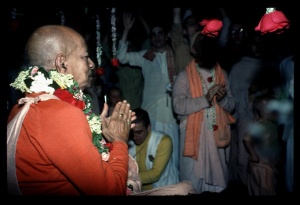CC Adi 6.99: Difference between revisions
m (1 revision(s)) |
(Vanibot #0054 edit - transform synonyms into clickable links, which search similar occurrences) |
||
| (One intermediate revision by one other user not shown) | |||
| Line 1: | Line 1: | ||
{{ | [[Category:Sri Caitanya-caritamrta - Adi-lila Chapter 06|C099]] | ||
<div style="float:left">'''[[Sri Caitanya-caritamrta|Śrī Caitanya-caritāmṛta]] - [[CC Adi|Ādi-līlā]] - [[CC Adi 6|Chapter 6: The Glories of Śrī Advaita Acārya]]'''</div> | |||
<div style="float:right">[[File:Go-previous.png|link=CC Adi 6.98|Ādi-līlā 6.98]] '''[[CC Adi 6.98|Ādi-līlā 6.98]] - [[CC Adi 6.100|Ādi-līlā 6.100]]''' [[File:Go-next.png|link=CC Adi 6.100|Ādi-līlā 6.100]]</div> | |||
{{CompareVersions|CC|Adi 6.99|CC 1975|CC 1996}} | |||
{{RandomImage}} | |||
==== TEXT 99 ==== | ==== TEXT 99 ==== | ||
<div | <div class="verse"> | ||
jyeṣṭha-bhāve aṁśīte haya prabhu-jñāna | :jyeṣṭha-bhāve aṁśīte haya prabhu-jñāna | ||
kaniṣṭha-bhāve āpanāte bhakta-abhimāna | :kaniṣṭha-bhāve āpanāte bhakta-abhimāna | ||
</div> | </div> | ||
| Line 12: | Line 16: | ||
==== SYNONYMS ==== | ==== SYNONYMS ==== | ||
<div | <div class="synonyms"> | ||
jyeṣṭha- | ''[//vanipedia.org/wiki/Special:VaniSearch?s=jyeṣṭha&tab=syno_o&ds=1 jyeṣṭha]-[//vanipedia.org/wiki/Special:VaniSearch?s=bhāve&tab=syno_o&ds=1 bhāve]'' — in the emotion of being superior; ''[//vanipedia.org/wiki/Special:VaniSearch?s=aṁśīte&tab=syno_o&ds=1 aṁśīte]'' — in the original source of all incarnations; ''[//vanipedia.org/wiki/Special:VaniSearch?s=haya&tab=syno_o&ds=1 haya]'' — there is; ''[//vanipedia.org/wiki/Special:VaniSearch?s=prabhu&tab=syno_o&ds=1 prabhu]-[//vanipedia.org/wiki/Special:VaniSearch?s=jñāna&tab=syno_o&ds=1 jñāna]'' — knowledge as master; ''[//vanipedia.org/wiki/Special:VaniSearch?s=kaniṣṭha&tab=syno_o&ds=1 kaniṣṭha]-[//vanipedia.org/wiki/Special:VaniSearch?s=bhāve&tab=syno_o&ds=1 bhāve]'' — in an inferior conception; ''[//vanipedia.org/wiki/Special:VaniSearch?s=āpanāte&tab=syno_o&ds=1 āpanāte]'' — in Himself; ''[//vanipedia.org/wiki/Special:VaniSearch?s=bhakta&tab=syno_o&ds=1 bhakta]-[//vanipedia.org/wiki/Special:VaniSearch?s=abhimāna&tab=syno_o&ds=1 abhimāna]'' — the conception of being a devotee. | ||
</div> | </div> | ||
| Line 19: | Line 23: | ||
==== TRANSLATION ==== | ==== TRANSLATION ==== | ||
<div | <div class="translation"> | ||
The source of all incarnations has the emotions of a superior when He considers Himself the master, and He has the emotions of an inferior when He considers Himself a devotee. | The source of all incarnations has the emotions of a superior when He considers Himself the master, and He has the emotions of an inferior when He considers Himself a devotee. | ||
</div> | </div> | ||
| Line 26: | Line 30: | ||
==== PURPORT ==== | ==== PURPORT ==== | ||
<div | <div class="purport"> | ||
A fraction of a particular thing is called a part, and that from which the fraction is distinguished is called the whole. Therefore the fraction, or part, is included within the whole. The Lord is the whole, and the devotee is the part or fractional part. That is the relationship between the Lord and the devotee. There are also gradations of devotees, who are calculated as greater or lesser. When a devotee is great he is called prabhu, and when he is lesser he is called bhakta, or a devotee. The supreme whole is Kṛṣṇa, and Baladeva and all Viṣṇu incarnations are His fractions. Lord Kṛṣṇa is therefore conscious of His superior position, and all Viṣṇu incarnations are conscious of Their positions as devotees. | A fraction of a particular thing is called a part, and that from which the fraction is distinguished is called the whole. Therefore the fraction, or part, is included within the whole. The Lord is the whole, and the devotee is the part or fractional part. That is the relationship between the Lord and the devotee. There are also gradations of devotees, who are calculated as greater or lesser. When a devotee is great he is called ''prabhu'', and when he is lesser he is called ''bhakta'', or a devotee. The supreme whole is Kṛṣṇa, and Baladeva and all Viṣṇu incarnations are His fractions. Lord Kṛṣṇa is therefore conscious of His superior position, and all Viṣṇu incarnations are conscious of Their positions as devotees. | ||
</div> | </div> | ||
__NOTOC__ | |||
<div style="float:right; clear:both;">[[File:Go-previous.png|link=CC Adi 6.98|Ādi-līlā 6.98]] '''[[CC Adi 6.98|Ādi-līlā 6.98]] - [[CC Adi 6.100|Ādi-līlā 6.100]]''' [[File:Go-next.png|link=CC Adi 6.100|Ādi-līlā 6.100]]</div> | |||
__NOTOC__ | |||
__NOEDITSECTION__ | |||
Latest revision as of 19:13, 19 February 2024

A.C. Bhaktivedanta Swami Prabhupada
TEXT 99
- jyeṣṭha-bhāve aṁśīte haya prabhu-jñāna
- kaniṣṭha-bhāve āpanāte bhakta-abhimāna
SYNONYMS
jyeṣṭha-bhāve — in the emotion of being superior; aṁśīte — in the original source of all incarnations; haya — there is; prabhu-jñāna — knowledge as master; kaniṣṭha-bhāve — in an inferior conception; āpanāte — in Himself; bhakta-abhimāna — the conception of being a devotee.
TRANSLATION
The source of all incarnations has the emotions of a superior when He considers Himself the master, and He has the emotions of an inferior when He considers Himself a devotee.
PURPORT
A fraction of a particular thing is called a part, and that from which the fraction is distinguished is called the whole. Therefore the fraction, or part, is included within the whole. The Lord is the whole, and the devotee is the part or fractional part. That is the relationship between the Lord and the devotee. There are also gradations of devotees, who are calculated as greater or lesser. When a devotee is great he is called prabhu, and when he is lesser he is called bhakta, or a devotee. The supreme whole is Kṛṣṇa, and Baladeva and all Viṣṇu incarnations are His fractions. Lord Kṛṣṇa is therefore conscious of His superior position, and all Viṣṇu incarnations are conscious of Their positions as devotees.